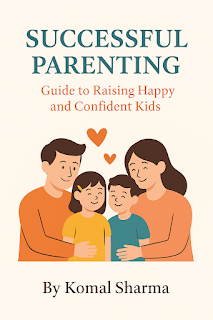In a world full of screens, deadlines, and distractions, the emotional bond between parents and children is silently weakening. While we try to provide the best education, food, and lifestyle for our kids, we often forget the one thing they need the most — emotional connection.
Welcome to the world of emotional parenting — where love is not just spoken but deeply felt. In this post, we’ll explore what emotional parenting truly means and how you can build a strong, loving, and lasting bond with your child that goes beyond rules and routines.
---
🧠 What Is Emotional Parenting?
Emotional parenting is the art of understanding, acknowledging, and responding to your child’s emotions — not just their behaviors.
It means:
Listening with your heart, not just your ears
Accepting their feelings without judgment
Guiding them with compassion rather than commands
It doesn’t require expensive toys or perfect plans — just presence, patience, and empathy.
---
🗣️ Why Emotional Connection Matters More Than Ever
Today’s children are growing up in an overstimulated world. They face:
Academic pressure
Social comparison on social media
Less face-to-face emotional time with parents
Without emotional guidance, they may:
Suppress their feelings
Struggle with anxiety or anger
Fail to form healthy relationships in adulthood
But with emotionally available parents, kids learn to:
Express themselves confidently
Trust others
Develop emotional intelligence
---
❤️ 7 Simple Ways to Emotionally Connect With Your Child
1. Practice Active Listening
When your child talks, pause everything — even your phone. Look into their eyes, nod gently, and listen without interrupting.
Even a simple “Hmm, I hear you,” builds trust.
2. Validate Their Emotions
Don’t dismiss their feelings as “drama” or “nonsense.”
Instead, say:
“It’s okay to feel sad.”
“I can see that made you angry.”
“You’re allowed to feel frustrated.”
Validating emotions doesn’t mean agreeing, it means acknowledging.
3. Create ‘Emotion Time’ Daily
Just like dinner or bedtime, fix a 10-minute window daily where your child can talk about anything — no judgment, no advice, just sharing.
Call it your “Heart Talk Time.”
4. Share Your Own Feelings Too
Children learn how to express by watching you.
Say things like:
“I was nervous today before my meeting.”
“I felt hurt when I was left out.”
This shows that emotions are normal and okay to talk about.
5. Use Gentle Discipline, Not Harsh Words
Instead of shouting:
> “What’s wrong with you?”
Say: “I see you're upset. Let’s talk about what happened.”
Gentle correction + calm voice = long-term respect and understanding.
6. Use Physical Affection
A warm hug, a back rub, or holding hands builds a sense of security.
Even teens — who act like they don’t care — benefit from a loving touch.
7. Encourage Expression Through Art or Stories
Sometimes kids can't talk about their feelings, but they’ll draw them or act them out in stories. Encourage creative outlets.
---
👨👩👧👦 Emotional Parenting Is Not About Perfection
It's okay to have bad days. You're human.
But what matters is that you keep showing up emotionally.
Even 15 minutes of real connection each day is better than hours of distracted time.
---
🌟 Real-Life Example:
Meet Priya, a working mother of two. For years, she tried being a “perfect mom” — packed lunches, top grades, best clothes. But one day, her 7-year-old asked:
> “Mom, why are you always in a hurry?”
That question changed her. She started slowing down, reading bedtime stories, asking how their day was — not just what they scored in tests.
Today, her kids don’t just see her as “mom” — they see her as a safe space.
---
📚 Emotional Parenting Helps Your Child To:
Build self-worth and confidence
Develop healthy relationships in life
Learn how to manage emotions — not bury them
Trust you enough to talk about anything — even as teenagers
---
📝 Conclusion
You don’t need to be a perfect parent.
You just need to be a present, emotionally available one.
Start today:
Listen more
Judge less
Love out loud
Because when children feel heard and accepted, they bloom — not just in school, but in life.
---


